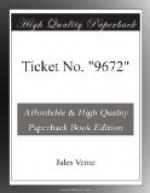Can one imagine a more charming posada in Italy, or a more seductive fonda in Spain? No. And the crowd of English tourists have not yet raised the scale of prices as in Switzerland—at least, they had not at the time of which I write. In Dal, the current coin is not the pound sterling, the sovereign of which the travelers’ purse is soon emptied. It is a silver coin, worth about five francs, and its subdivisions are the mark, equal in value to about a franc, and the skilling, which must not be confounded with the English shilling, as it is only equivalent to a French sou.
Nor will the tourist have any opportunity to use or abuse the pretentious bank-note in the Telemark. One-mark notes are white; five-mark notes are blue; ten-mark notes are yellow; fifty-mark notes, green; one hundred mark notes, red. Two more, and we should have all the colors of the rainbow.
Besides—and this is a point of very considerable importance—the food one obtains at the Dal inn is excellent; a very unusual thing at houses of public entertainment in this locality, for the Telemark deserves only too well its surname of the Buttermilk Country. At Tiness, Listhus, Tinoset, and many other places, no bread is to be had, or if there be, it is of such poor quality as to be uneatable. One finds there only an oaten cake, known as flat brod, dry, black, and hard as pasteboard, or a coarse loaf composed of a mixture of birch-bark, lichens, and chopped straw. Eggs are a luxury, and a most stale and unprofitable one; but there is any quantity of poor beer to be had, a profusion of buttermilk, either sweet or sour, and sometimes a little coffee, so thick and muddy that it is much more like distilled soot than the products of Mocha or Rio Nunez.
In Dame Hansen’s establishment, on the contrary, cellar and larder were alike well-stored. What more could the most exacting tourist ask than salmon, either salt or smoked—fresh salmon that have never tasted tainted waters, fish from the pure streams of the Telemark, fowls, neither too fat nor too lean, eggs in every style, crisp oaten and barley cakes, fruits, more especially strawberries, bread—unleavened bread, it is here, but of the very best quality—beer, and some old bottles of that Saint Julien that have spread the fame of French vineyards even to this distant land?
And this being the case, it is not strange that the inn at Dal is well and favorably known in all the countries of Northern Europe.
One can see this, too, by glancing over the register in which many travelers have not only recorded their names, but paid glowing tributes to Dame Hansen’s merits as an inn-keeper. The names are principally those of Swedes and Norwegians from every part of Scandinavia; but the English make a very respectable showing; and one of them, who had waited at least an hour for the summit of Gousta to emerge from the morning mist that enveloped it, wrote upon one of the pages:




